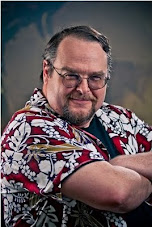Harlan Ellison was an amazing writer, both in the quantity and quality of his work, and the strength of his persona. Over his career he moved from enfant terrible to cause celebre to curmudgeon to eminence grise. Most writers who existed in the past 50 years, even in fields tangential to science fiction, have at least one Harlan Ellison story. Here's one from me:
The Chicago Comic's Convention, at one time, hosted writers. That included comic book writers and words-on-paper for books without pictures writers. And we were stationed at the main entranceway at a long table as the con-goers passed en route to the dealer's area. What I remember in particular was being sat next to Jody Lynn Nye, and listening to her talk with a fan who said that one of her (Ms. Nye's) works was her (the fan's) favorite books, and Ms. Nye immediately quoting the first paragraph of that book verbatim.
But for the most part it was relaxed and a little bit empty. A lot of fans would pass by us, desperately trying to not make eye contact. We got a few fans, but nothing major. Except for this HUGE LINE queuing up across the hallway.
The line was for Harlan. Harlan had just published a book about the famous/infamous Star Trek script he had written - City on the Edge of Forever. And he had a LINE. A true, long, rock-star level LINE. All clutching Harlan Ellison books of various vintages. And, of course, we were a little jealous.
And we joked about it, and then Harlan arrived. And he goggled at the line. Physically took a step back. And he looked at the rest of us, with our one-or-two-or-no fans chatting us up. And Harlan sprung into action.
Harlan started HUXSTERING for us, the other writers. He went down the line and pushed for each and every one of us, telling the assembled masses (loudly) what great writers we were and how the fans should come talk to us. For those he knew he went on at length about their credits. For those he did not (myself included), he scanned the books in front of us and made something up. He went down the line, promoting each and every one of the writers, before taking his own spot and starting in a long, long signing session for the multitude of fans.
And you know what? I had a couple fans come up (after talking to Harlan) who said that they came over because Harlan recommended me to them. So, yeah, I'm a bit of a Harlan booster. Totally unexpected. And appreciated.
That's my Harlan story. The man was a story-teller, and could make a story out of mailing a letter. This is not an exaggeration - I was at an event where he went on at length about trying to mail a letter in Bellevue and not being able to find a mailbox, and anyone who knew what a mailbox WAS. He could be insufferable and offensive and kind and focused and angry. He was a real mensch and a pain in the tuchas. If you entered his orbit, you gave up any right to control the narrative. Gods help anyone who got in his way.
And he was great writer. His stuff was in total reprint when I was in college in the 70s, there were acres of his various books out, including his non-SF and his cartoon captions. Everything. People later remember him for his TV work, like Babylon Five, and in his bi-ennial (once every two years or so) scandal or lawsuit or something out there that brought him a lot of attention, deserved or not.
And now he's gone, but his stories are still here, filled with all the fury and vinegar accumulated through his life. They are a writer's immortality, really, after the lines dwindle and personal stories fade. Farewell, Harlequin. You have fought the good fight.
More later,
Mr. Taphouse
-
So, here's a sample entry in Philip Pullman's intriguing little book THE
IMAGINATION CHAMBER I wanted to share. I've broken up the lines to make for
easi...
1 week ago





